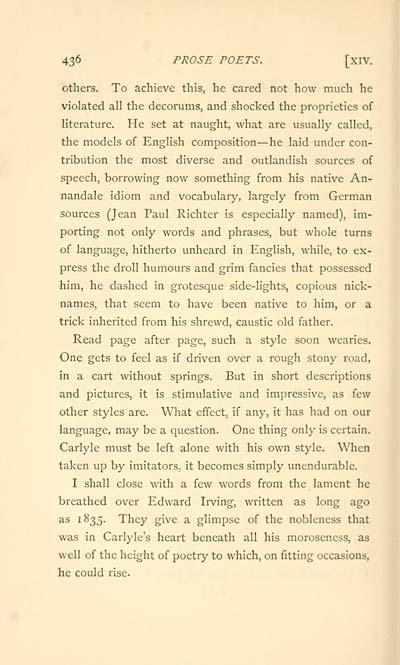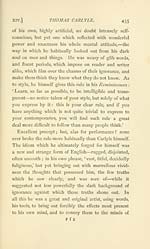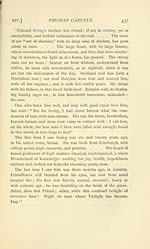Ossian Collection > Aspects of poetry
(452)
Download files
Complete book:
Individual page:
Thumbnail gallery: Grid view | List view

436 PROSE POETS. [XIV.
Others. To achieve this, he cared not how much he
violated all the decorums, and shocked the proprieties of
literature. He set at naught, what are usually called,
the models of English composition — he laid under con-
tribution the most diverse and outlandish sources of
speech, borrowing now something from his native An-
nandale idiom and vocabulary, largely from German
sources (Jean Paul Richter is especially named), im-
porting not only words and phrases, but whole turns
of language, hitherto unheard in English, while, to ex-
press the droll humours and grim fancies that possessed
him, he dashed in grotesque side-lights, copious nick-
names, that seem to have been native to him, or a
trick inherited from his shrewd, caustic old father.
Read page after page, such a style soon wearies.
One gets to feel as if driven over a rough stony road,
in a cart without springs. But in short descriptions
and pictures, it is stimulative and impressive, as few
other styles are. What effect, if any, it has had on our
language, may be a question. One thing only is certain.
Carlyle must be left alone with his own style. When
taken up by imitators, it becomes simply unendurable.
I shall close with a few words from the lament he
breathed over Edward Irving, written as long ago
as 1H35. They give a glimpse of the nobleness that
was in Carlyle's heart beneath all his morosencss, as
well of the height of poetry to which, on fitting occasions,
he could rise.
Others. To achieve this, he cared not how much he
violated all the decorums, and shocked the proprieties of
literature. He set at naught, what are usually called,
the models of English composition — he laid under con-
tribution the most diverse and outlandish sources of
speech, borrowing now something from his native An-
nandale idiom and vocabulary, largely from German
sources (Jean Paul Richter is especially named), im-
porting not only words and phrases, but whole turns
of language, hitherto unheard in English, while, to ex-
press the droll humours and grim fancies that possessed
him, he dashed in grotesque side-lights, copious nick-
names, that seem to have been native to him, or a
trick inherited from his shrewd, caustic old father.
Read page after page, such a style soon wearies.
One gets to feel as if driven over a rough stony road,
in a cart without springs. But in short descriptions
and pictures, it is stimulative and impressive, as few
other styles are. What effect, if any, it has had on our
language, may be a question. One thing only is certain.
Carlyle must be left alone with his own style. When
taken up by imitators, it becomes simply unendurable.
I shall close with a few words from the lament he
breathed over Edward Irving, written as long ago
as 1H35. They give a glimpse of the nobleness that
was in Carlyle's heart beneath all his morosencss, as
well of the height of poetry to which, on fitting occasions,
he could rise.
Set display mode to: Large image | Transcription
Images and transcriptions on this page, including medium image downloads, may be used under the Creative Commons Attribution 4.0 International Licence unless otherwise stated. ![]()
| Early Gaelic Book Collections > Ossian Collection > Aspects of poetry > (452) |
|---|
| Permanent URL | https://digital.nls.uk/78390696 |
|---|
| Description | Selected books from the Ossian Collection of 327 volumes, originally assembled by J. Norman Methven of Perth. Different editions and translations of James MacPherson's epic poem 'Ossian', some with a map of the 'Kingdom of Connor'. Also secondary material relating to Ossianic poetry and the Ossian controversy. |
|---|
| Description | Selected items from five 'Special and Named Printed Collections'. Includes books in Gaelic and other Celtic languages, works about the Gaels, their languages, literature, culture and history. |
|---|

